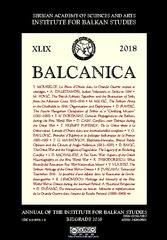Приказ основних података о документу
Eleftherios Venizelos, British Public Opinion and the Climax of Anglo-Hellenism (1915–1920)
| dc.creator | Markovich, Slobodan G. | |
| dc.date.accessioned | 2019-05-16T10:38:03Z | |
| dc.date.available | 2019-05-16T10:38:03Z | |
| dc.date.issued | 2018 | |
| dc.identifier.issn | 0350-7653 | |
| dc.identifier.uri | https://www.ceeol.com/search/article-detail?id=751398 | |
| dc.identifier.uri | https://dais.sanu.ac.rs/123456789/6063 | |
| dc.description.abstract | The paper analyses the construction of a more than favourable image of EleftheriosVenizelos in Britain in 1915–1920. Although Venizelos was highly praised and popular in Britain since at least 1913, his effort to bring Greece to the side of the Entente in 1915 made him exceptionally popular in Paris and particularly in London. Traditions of British philhellenism have been analysed, particularly the influence of two associations: the Hellenic Society founded in 1879 and, especially, the Anglo-Hellenic League established in 1913. The latter helped boost Venizelos’s image in Britain, but it also paved the way for Anglo-Hellenism, the belief of some influential Britons that the fate of modern Greece is inseparably linked with Britain. The Times leaders/editorials and key articles on Venizelos in 1915–1920 have been analysed to demonstrate the level of support and admiration that Venizelos gradually attained. The role of Ronald Burrows and the group of experts around The New Europe is particularly analysed in terms of how the image of Venizelos and Venzelist Greece was constructed. The degree of admiration for Venizelos in Britain has been dealt with through a number of periodicals and newspapers published in Britain during the Great War and through Venizelos’s biographies published in Britain with an aim to show how he became a widely respected super-celebrity. The views of leading British statesmen and opinion makers also indicate a quite high degree of identification with both Venizelos and Greek war aims in Britain in 1915–1920. The climax and the collapse of Anglo-Hellenism in 1919–20 are analysed at the end of the paper. When Venizelos lost the elections of November 1920, Anglo-Hellenism disappeared as a relevant factor in British politics, journalism and diplomacy. | en |
| dc.language | English | |
| dc.publisher | Belgrade : Institute for Balkan Studies, Serbian Academy of Sciences and Arts | |
| dc.relation | info:eu-repo/grantAgreement/MESTD/Basic Research (BR or ON)/177011/RS// | |
| dc.rights | openAccess | |
| dc.rights.uri | https://creativecommons.org/licenses/by-nc-nd/4.0/ | |
| dc.source | Balcanica | |
| dc.subject | Eleftherios Venizelos | |
| dc.subject | Ronald Burrows | |
| dc.subject | Anglo-Hellenism | |
| dc.subject | Anglo-Hellenic League | |
| dc.subject | The Times | |
| dc.title | Eleftherios Venizelos, British Public Opinion and the Climax of Anglo-Hellenism (1915–1920) | en |
| dc.type | article | en |
| dc.rights.license | BY-NC-ND | |
| dcterms.abstract | Марковицх, Слободан Г.; | |
| dc.citation.spage | 125 | |
| dc.citation.epage | 156 | |
| dc.citation.issue | XLIX | |
| dc.identifier.wos | 000462505500010 | |
| dc.identifier.doi | 10.2298/BALC1849125M | |
| dc.type.version | publishedVersion | en |
| dc.identifier.fulltext | https://dais.sanu.ac.rs/bitstream/id/19251/bitstream_19251.pdf | |
| dc.identifier.rcub | https://hdl.handle.net/21.15107/rcub_dais_6063 |

